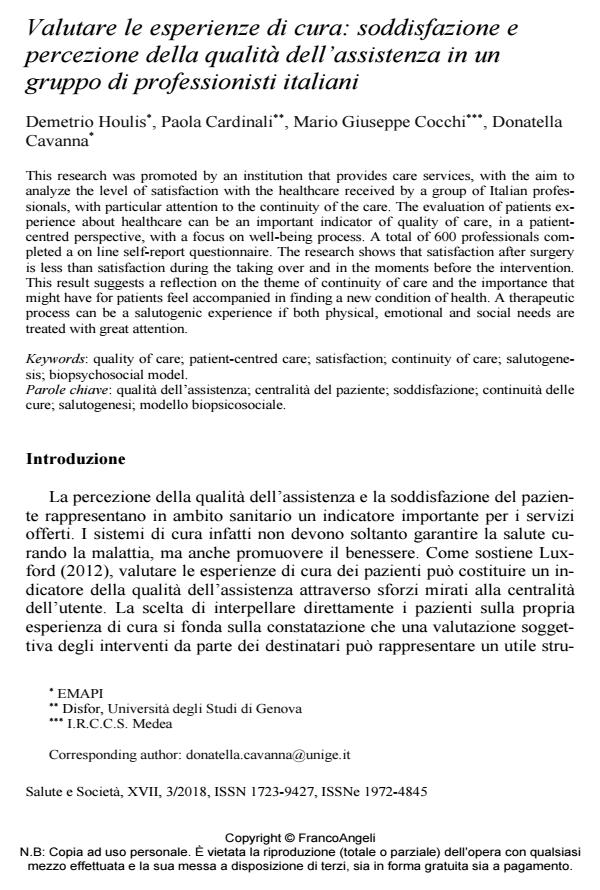Valutare le esperienze di cura: soddisfazione e percezione della qualità dell’assistenza in un gruppo di professionisti italiani
Journal title SALUTE E SOCIETÀ
Author/s Demetrio Houlis, Paola Cardinali, Mario Giuseppe Cocchi, Donatella Cavanna
Publishing Year 2018 Issue 2018/3
Language Italian Pages 18 P. 151-168 File size 236 KB
DOI 10.3280/SES2018-003011
DOI is like a bar code for intellectual property: to have more infomation
click here
Below, you can see the article first page
If you want to buy this article in PDF format, you can do it, following the instructions to buy download credits

FrancoAngeli is member of Publishers International Linking Association, Inc (PILA), a not-for-profit association which run the CrossRef service enabling links to and from online scholarly content.
This research was promoted by an institution that provides care services, with the aim to analyze the level of satisfaction with the healthcare received by a group of Italian profes-sionals, with particular attention to the continuity of the care. The evaluation of patients ex-perience about healthcare can be an important indicator of quality of care, in a patient-centred perspective, with a focus on well-being process. A total of 600 professionals completed a on line self-report questionnaire. The research shows that satisfaction after surgery is less than satisfaction during the taking over and in the moments before the intervention. This result suggests a reflection on the theme of continuity of care and the importance that might have for patients feel accompanied in finding a new condition of health. A therapeutic process can be a salutogenic experience if both physical, emotional and social needs are treated with great attention.
Keywords: Quality of care; patient-centred care; satisfaction; continuity of care; salutogenesis; biopsychosocial model.
- The Caregiving Experiences of Fathers and Mothers of Children With Rare Diseases in Italy: Challenges and Social Support Perceptions Paola Cardinali, Laura Migliorini, Nadia Rania, in Frontiers in Psychology 1780/2019
DOI: 10.3389/fpsyg.2019.01780 - How Could Self-Determination Theory Be Useful for Facing Health Innovation Challenges? Laura Migliorini, Paola Cardinali, Nadia Rania, in Frontiers in Psychology 1870/2019
DOI: 10.3389/fpsyg.2019.01870
Demetrio Houlis, Paola Cardinali, Mario Giuseppe Cocchi, Donatella Cavanna, Valutare le esperienze di cura: soddisfazione e percezione della qualità dell’assistenza in un gruppo di professionisti italiani in "SALUTE E SOCIETÀ" 3/2018, pp 151-168, DOI: 10.3280/SES2018-003011